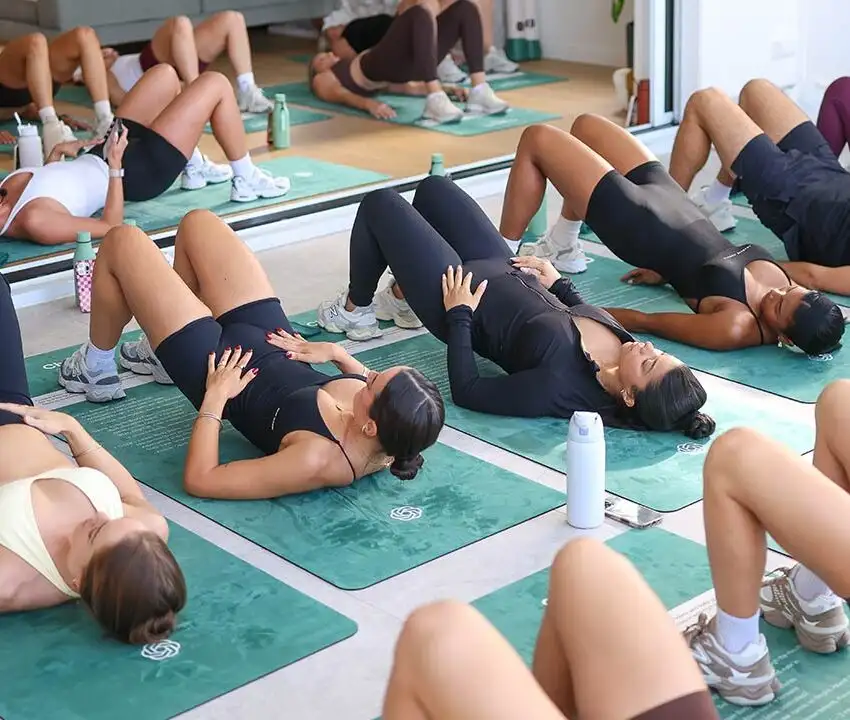
Sexologist Chantelle Otten Answers Your Burning Questions About Sex
Let's talk about sex
By Natalie McGowan | 1st October 2024There’s no denying that the way we talk about sex in 2024 is different to how it used to be. Once considered taboo and inappropriate, conversations surrounding sexual health and wellness are becoming more and more normalised. Among those leading the movement? Psycho-sexologist, relationship expert, and host of Audible Original series Sex Therapy: Season 2, Chantelle Otten. With a mission to spark dialogue about sex that is fun, engaging, and conversational, she’s breaking down barriers one conversation at a time.
Ahead of the 2025 KAILO Summit where she will be a keynote speaker, we chatted with Chantelle to get our burning questions about sex answered once and for all.
What are the main types of issues and concerns people come to you with?
The main concerns people come to me with are often related to intimacy, sexual self-esteem, and relationship dynamics. A lot of clients struggle with communication in their relationships – whether it’s about desires, boundaries, or emotional needs. Sexual dysfunction, mismatched libidos, and navigating life transitions like parenthood or ageing are also common topics. On a deeper level, many clients seek support in reconnecting with their own sexuality and overcoming feelings of shame or insecurity that can hold them back from fully enjoying their intimate lives.
For those who don’t know what sex therapy entails, can you please explain what it is and what you help clients with?
Sex therapy is all about creating a safe and supportive space where people can explore their sexual concerns, desires, and relationships without judgement. It’s not just about the physical aspects of sex, but also the emotional, psychological, and relational dimensions. My role is to guide patients through these conversations, helping them understand and overcome challenges like low libido, anxiety, or communication issues with their partners. It’s about empowering people to feel more confident and fulfilled in their sexual lives, no matter where they’re starting from.
What tips would you give couples to keep intimacy and passion alive in a long-term relationship?
One great way to keep intimacy alive is to surprise each other with small gestures of love – whether it’s leaving a note, planning a spontaneous date, or simply paying each other a compliment. It’s about keeping the romance and excitement going, even in the little things. Also, try switching up your routine! Routine can become a passion killer, so mix things up, whether that’s trying something new together or taking a mini break. And most importantly, make time for uninterrupted, distraction-free connection – whether it’s physical intimacy or just deep conversations.
What are some tips you have for enhancing sexual satisfaction for both partners?
Enhancing sexual satisfaction is often about building emotional intimacy just as much as physical. One tip is to practice responsive desire, where instead of waiting to feel ‘in the mood’, you engage in intimate touch or kissing to slowly build arousal. It’s also helpful to create a space where both partners feel safe to express their desires or hesitations without fear of rejection. Lastly, focus on pleasure beyond just orgasm. Sometimes, the journey – the foreplay, the exploration – can bring just as much satisfaction as the finale.
What’s one thing you wish everyone knew about sex?
I wish everyone knew that sex isn’t about performance – it’s about connection and enjoyment. There’s so much pressure to look or act a certain way, but the truth is, the best sexual experiences happen when you’re present, relaxed, and truly in tune with your partner or yourself. It’s not about how often you’re having sex or hitting a certain ‘goal’; it’s about finding what feels good, letting go of expectations, and being open to exploration. When we remove the pressure, we allow space for deeper intimacy and more authentic pleasure.
What advice would you give to women who find it challenging to achieve orgasm?
For vulva owners who struggle to achieve orgasm, I suggest focusing on the journey rather than the destination. Mindfulness can be incredibly helpful here – being present in your body and allowing yourself to feel pleasure without pressure. Don’t hesitate to explore different types of stimulation or techniques, as everyone’s body responds differently. Sometimes, trying out different positions or incorporating toys can make all the difference. And remember, every woman’s experience is unique, so it’s all about finding what works for you, without judgement or comparison.
What are the common misconceptions about sex therapy you’d like to debunk/set straight?
One of the biggest misconceptions about sex therapy is that it’s only for people with serious problems or dysfunctions, but that couldn’t be further from the truth. Many people think it’s all about fixing something that’s broken, when in reality, it’s about enhancing and understanding your sexual wellbeing, whether you’re facing challenges or just want to explore something new. Another myth is that sex therapy is only for couples – individuals can benefit just as much. It’s about fostering a healthy, positive relationship with your sexuality, no matter where you are on that journey.
Generally, how good/bad do you think Australians are when it comes to openly talking about sex with each other?
Australians are getting better at talking openly about sex, but there’s still a long way to go. We have a tendency to shy away from these conversations, often due to lingering taboos and a bit of that classic ‘she’ll be right’ attitude. While more people are beginning to understand the importance of discussing sex openly and honestly, many still feel uncomfortable or unsure about how to start those conversations. The good news is that with platforms like podcasts, social media, and therapy, we’re slowly breaking down those barriers and creating a more sex-positive culture.
How do your client sessions at your clinic vs on the podcast differ?
The main difference between the sessions at my clinic and those on the podcast is the setting and the level of exposure. In the clinic, sessions are deeply private and personalised, focusing solely on the individual or couple’s unique experiences and challenges. On the podcast, although real patients are attending real sessions with me, there’s an added layer of awareness that the session is being recorded. This doesn’t change the authenticity of the work we do together, but it does mean we carefully consider what’s shared to protect the patient’s privacy while still providing valuable insights to the listeners. The podcast offers a rare and honest glimpse into the therapeutic process, but always with the patient’s consent and comfort at the forefront.
What are three pieces of advice every Australian could benefit from when it comes to sex/relationships?
1. Prioritise open communication: talk openly with your partner about your needs, desires, and boundaries. Honest conversations build trust and intimacy, making it easier to navigate challenges together.
2. Normalise seeking help: don’t be afraid to reach out for support, whether it’s through therapy, reading, or workshops. Just as you’d see a doctor for physical health, taking care of your sexual and relational wellbeing is essential.
3. Embrace curiosity and growth: relationships and sexual experiences evolve over time. Stay curious, be open to learning and exploring new aspects of your connection, and remember that growth is a natural part of any healthy relationship.
You’ll be speaking at the 2025 KAILO Summit. What are your key talking points going to be?
At The Kailo Summit, my key talking points are going to focus on all the fun things – sex, enhancing sexual health, and building stronger relationships. I’ll be diving into how self-esteem and confidence play a huge role in our sexual experiences and how we connect with others. Communication is also a big one – it’s the foundation of intimacy, and I’ll be sharing tips on how to talk openly about desires, boundaries, and everything in between. Overall, it’s about creating a space where people feel empowered to explore their sexual health and relationships in a more fulfilling way.
Is there anything else you’d like to add?
Just a final note: it’s important to remember that everyone’s journey with sex and relationships is unique. What works for one person or couple might not work for another, and that’s perfectly okay. The key is to approach these aspects of your life with openness, compassion, and a willingness to learn and adapt. If there’s one takeaway, it’s that investing in your sexual wellbeing is just as important as any other aspect of your health, and it can significantly enhance your overall quality of life.
Chantelle’s Audible Original series Sex Therapy: Season 2 is out now.








